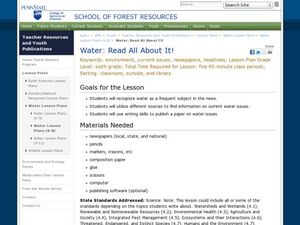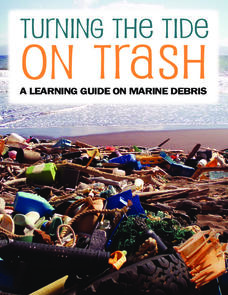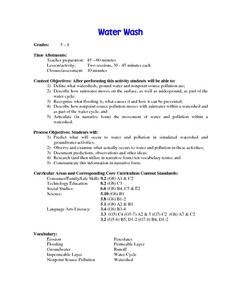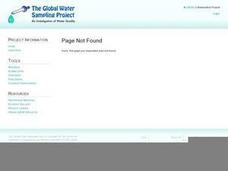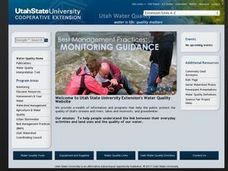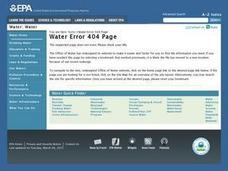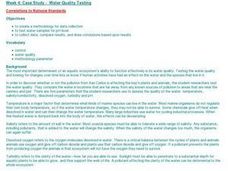Curated OER
Water
Learners learn about the history of Indiana's water and understand how easily pollution can contaminate the water supply. They also learn how little fresh water we have and how important it is to protect it.
Curated OER
Working With Environmental Issues
Students consider the source of disease and parasites in West Africa. In this environmental issues lesson plan, students read "Working with Environmental Issues," by Fred Koehler. Students participate in an activity that requires...
Curated OER
Pollution Assessment: Is Wood Lake a Good Lake?
Students become aware of pollution in Richfield Minnesota's Wood Lake, identify sources of pollution in Wood Lake, learn to use variables, equations, spreadsheets and modeling software, and generate solutions for the problem.
Curated OER
Water: Read All About It!
Students discuss newspapers and water and work in groups to develop their own paper focusing on water issues. In this journalism lesson, students discuss the value of newspapers and water as an issue. They work as a group to develop a...
NOAA
Turning the Tide on Trash: A Learning Guide on Marine Debris
The lessons in this learning guide are designed to increase youngsters' awareness of the impacts of marine debris and to teach them about pollution prevention techniques. This fabulous, 30-page packet is chock full of important...
Curated OER
Water Pollution Lesson Plan: Don't Trust Your Eyes
Students develop a list of actions they could perform that would protect our water resources from pollution. They formulate hypotheses, conduct experiments and draw conclusions about actual pollutants found in our water supply.
Curated OER
Saving the Bay
Learners investigate water pollution prevention. In this ecology wastewater lesson, students activate prior knowledge about sewage, then view a video explaining the waste water sewage system used in the San Francisco Bay area. Learners...
Curated OER
CONTAMINANT SCAVENGER HUNT
Pupils identify substances and activities within a household that contribute to water pollution and identify safe cleaning alternatives for commercial cleaning products.
Curated OER
Water: Naturally Cleaned
Students use stream trays covered in different types of rocks or soil to investigate infiltrates and runoff. In this water pollution instructional activity, students work in groups with stream trays that have different substrates. They...
Curated OER
Water Quality Tests Explained
Students identify the eight tests done to check for water quality. In this ecology lesson, students explain why it's important to test water in rivers. They explore sources of river water pollution.
Curated OER
Water Wash
Students define watersheds, ground water and nonpoint source pollution. They describe how rainwater moves on the surface, as well as underground, as part of the water cycle. They recognize what flooding is as well as its causes.
Curated OER
Watershed Landscape
Students demonstrate how water flows by building a human watershed using themselves. In this ecology lesson plan, students compare and contrast point-source and non-point source pollution. They write what they have learned from this...
Curated OER
Pollution Prevention
Students examine pollution and what causes it. They discover ways to reduce pollution and how to prevent it in the future.
Curated OER
What's Down the Well?
Students examine how environmental engineers determine possible sites for drinking water wells. They listen to a teacher led-lecture, and create their own groundwater well model using a coffee can and wire screening, observing how...
Curated OER
TE Lesson: How Clean is that Water?
Students examine the factors the affect water quality, and allow for animals and plants to live. They look at how engineers apply water quality information when making stream modifications in order to ensure drinking water quality. They...
Curated OER
How Much Water is There?
Students investigate the amount of fresh water on earth and which water can be used for consumption. In this fresh water lesson plan, students calculate the amount of fresh water that can be used for consumption on earth. They use a 5...
Curated OER
Preventing Water Pollution
Fourth graders write at least two ways to clean the water and two ways to prevent pollution with appropriate guesses, striving not to create any more pollution in the water. They understand how pollution affects water as well as the rest...
Curated OER
Are You Thirsty? The Effects of Pollution on Drinking Water
Discuss the availability of clean, plentiful water and the causes of water pollution. In groups, sixth graders discuss problem-solving methods for keeping water clean. They explore the function of water treatment plants and perform...
Curated OER
Surface Water Model
Students examine, through demonstration and experimentation, how water moves through watershed, identify pollutants that can enter water system from different land use activities, and discuss ways people can help prevent water pollution.
Curated OER
How Our Water Becomes Polluted
Learners list causes of water pollution, discuss how people contribute to water pollution, and explain concept of watershed.
Curated OER
Midnight Dumpers
Students explain how pollution affects ground water. They participate in a simulation to discover the location of an illegal dump. Students explore the monetary benefits, risk and environmental concerns are factors in business decisions.
Curated OER
Tracking Pollution - A Hazardous Whodunit
Students read a story problem about the issue of hazardous waste and pollution in a fictional town. In groups, they create a topographical map and predict how the water might flow and determine the place of contamination. To end the...
Curated OER
Water Quality Testing
Student explore factors affecting ecosystems. They test local water samples for pH level. After creating a methodology for data collection, they collect data, compare results, and draw conclusions based upon results.
Curated OER
Water Cycle
Ninth graders explore ways water moves through various reservoirs on Earth, examine how human activities change water cycle, investigate substances present in water that indicate human activity, and discuss how understanding water cycle...





